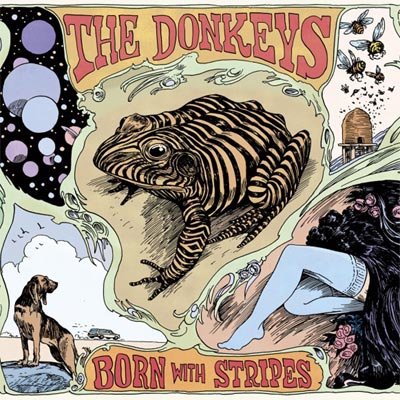
Born With Stripes is a chameleon of an album. It starts off with a catchy, pop — “accessible indie,” as I like to call it — number, entitled “We Don’t Know Who We Are.” This album has so many varied styles (from blues to psychedelic to Indian-influenced) that I don’t think this album quite knows who it is; but that’s okay.
This first track and its two subsequent tracks have been on consistent rotation in my brain since I first listened to this disc. Track two, “I Like The Way You Walk,” is a very inviting tune, and it does associate well with “We Don’t Know Who We Are”; these two songs are from the same family, as it were. However, track three, “Bloodhound,” enters the scene and all bets are off. This is the stone cold blues track of Born With Stripes. It is easily my vote for best track on the entire album. With lines like, “I’ll need a bloodhound just to track her down, but she’ll be mine again,” and carefully-placed background “oooo-oooo”‘s, it is difficult not to love this song. But that’s the genius of blues; it is a stereotypically cool genre of music (and what a nice stereotype to have!).
The “West Coast Raga” and later “East Coast Raga” would fit in well as B-Sides to The Beatles’ 1966 classic Revolver, with their sitar sounds, spiraling guitar lines, and hypnotic basslines and drum beats. These tracks stick out and clash with the other tracks until about halfway through these songs, when the listener gets enveloped by them; and, at that point, it is all aural gravy. A friend overheard me listening to “Bullfrog Blues” and said it could very easily be a lost Lovin’ Spoonful track. On that note, I feel that “New Blue Stockings” has a Doors-y or Jefferson Airplane-y motif to it. So, the ’60s are represented very well in this disc.
“Valerie,” my second favorite track on the album, is in a similar style to the ones just mentioned, but with even more of an epic quality to its progression. With a climax of guitar happening around minute four, this piece in particular has a touch of Pink Floyd, especially with the way it carries on through a spaced-out cacophony of noise and returns to the refrain on the other side unmarred.
This album is a veritable time machine and concord jet. With one song, it could be the 1960s and the next it could be present day — just as with one song you could be at a blues club in Chicago, and then next song you are in India. For an unsuspecting, 45-minute album, Born With Stripes is quite a journey. Going back to track one for some more lyrics, “I’m a mover, you’re a shaker/ I’m a clutch three point shot maker,” The Donkeys illustrate how they don’t take themselves too seriously, but still find themselves to be important enough.






